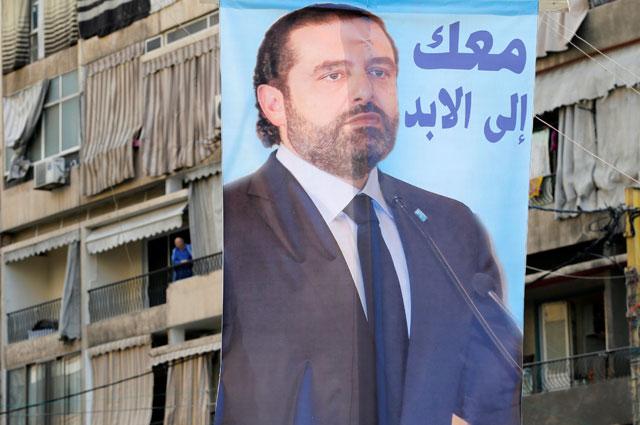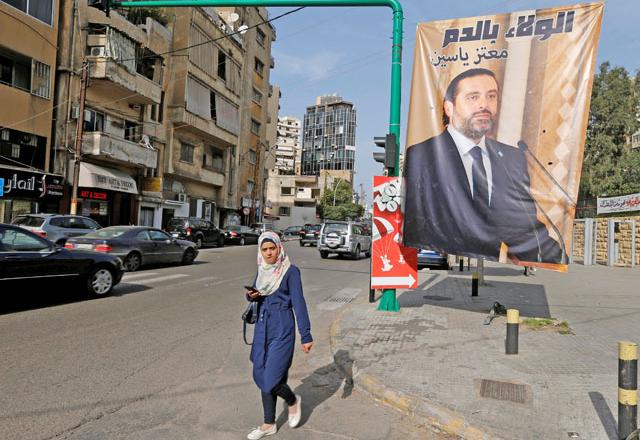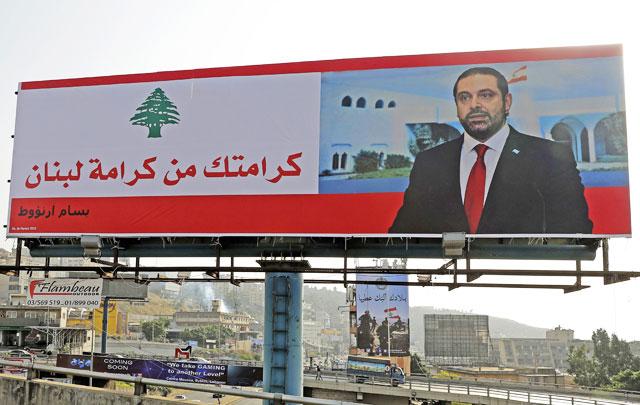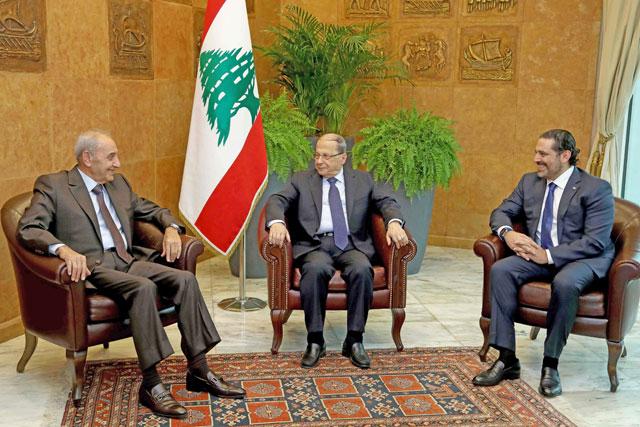You are here
Lebanon president urges unity after PM quits, toppling ruling coalition
By Reuters - Nov 06,2017 - Last updated at Nov 06,2017

A poster depicting Lebanon’s prime minister Saad Al Hariri, who has resigned from his post, hangs along a street in the mainly Sunni Beirut neighbourhood of Tariq Al Jadideh in Beirut, Lebanon, on Monday. The Arabic on the poster reads, ‘With you forever’ (Reuters photo)
BEIRUT — Lebanon's president appealed for national unity on Monday after prime minister Saad Al Hariri quit in a broadcast from Saudi Arabia, collapsing the coalition government and plunging the country into political crisis.
In a televised speech on Saturday, Hariri shocked even his close aides by resigning. Lebanon's most influential Sunni politician, Hariri said he feared an assassination plot against him, accusing Iran and its Lebanese ally Hizbollah, which was part of his
coalition, of breeding strife in the Arab
world.
The government was painstakingly devised to group key sectarian factions including the Iran-backed, Shiite Hizbollah. Its leader Sayyed Hassan Nasrallah accused Saudi Arabia of forcing Hariri to go and said there were "legitimate questions" over whether he had been detained in the kingdom.
Aides to Hariri, whose family made their fortune in the Saudi construction industry, have strongly denied such claims.
Interior Minister Nohad Machnouk, a senior member of Hariri’s political party, said he was under the impression the premier would return to Beirut within days.
A meeting between Saudi King Salman and Hariri in Riyadh on Monday proved “rumours” wrong, he said — an apparent reference to speculation that Hariri was detained or forced to quit.
Speculation in Lebanon over Hariri’s status bubbled as Saudi Arabia underwent an anti-corruption purge in which royals, ministers and investors have been arrested as the putative next king tightens his grip on power.
Lebanese President Michel Aoun held a meeting with ministers and top security officials at Baabda Palace, telling them that political leaders had been responsive to calls for calm.
“He stressed that security, economic, financial and political stability is a red line,” Justice Minister Salim Jreissati said after the meeting.
Aoun will take no steps to decide on whether to accept the resignation before Hariri returns from abroad, said Jreissati, who is politically aligned with Hizbollah.
“The president is waiting for Hariri’s return to hear from him personally,” he said. “This indicates a sovereign vision... and that the resignation must be voluntary in every sense.”
Fragile economy
Finance Minister Ali Hassan Khalil said Lebanon and its financial institutions could cope with the impact of the surprise resignation.
“We are confident in the stability of the financial and monetary situation in the country. There are no very big challenges ahead of us,” he said on Monday after a meeting with the president.
Lebanese dollar bonds fell across the curve and credit default swaps jumped on Monday.
The central bank sought to calm fears that the political turmoil would hit Lebanon’s already fragile economy.
Governor Riad Salameh told local television that the monetary situation was stable and markets were normal. There was no danger to the Lebanese pound, which is pegged to the US dollar, he added.
Televised resignation
“Lebanon, after the resignation, will never be the same as before,” Saudi Gulf Affairs Minister Thamer Al Sabhan said in a tweet on Monday. “It will not accept to be in any case a platform for launching terrorism to our countries.”
In his speech, Hariri accused Iran of a “deep hatred for the Arab nation” and Hizbollah of pointing its weapons at Yemenis, Syrians and Lebanese.
Hezbollah’s ties to Iran and its support for President Bashar Assad in neighbouring Syria’s war have been a significant source of strife in Lebanon for years.
The crisis could re-aggravate tensions between Sunni and Shiite Muslims and afflict the Lebanese government with paralysis once again. All of the sides have called for calm and there has been no sign of unrest since Hariri’s resignation.
His coalition government took office last year in a political deal that made Aoun, a Hizbollah ally, president. The deal ended years of deadlock, and last month it produced Lebanon’s first budget since 2005.
Hariri flew to Saudi Arabia on Friday after meeting in Beirut the top adviser to Iran’s Supreme Leader, who described the coalition as “a victory” and “great success” afterwards.
Related Articles
BEIRUT — Lebanese President Michel Aoun, who has refused to accept Saad Hariri's resignation as prime minister unless Hariri returns from Sa
BEIRUT — Saad Al Hariri will return to Lebanon from Saudi Arabia within two days, he said on Tuesday, 10 days after his shock resignation as
BEIRUT — President Michel Aoun held talks on Monday with other Lebanese political leaders over the future of Prime Minister Saad Al Hariri’s



















